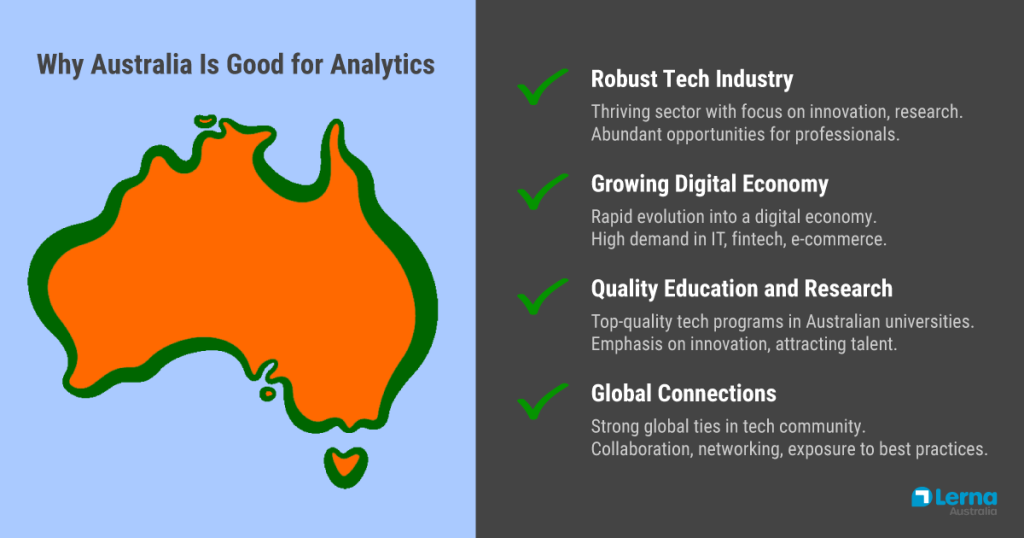Discover the value of a degree where you learn to improve company performance.

In a Master of Business Analytics, you learn statistical analysis, data mining, predictive modelling, programming, and visual presentation. You also explore how to extract real-world insights from data to inform company strategies.
Earning this qualification promises significant rewards, and you've likely heard about the strong demand for professionals with analytic skills. We believe the hype is real, and getting the degree should be highly rewarding. However, let's delve into why a degree in business analytics in Australia is worthwhile.
Overview
A Masters in Business Analytics is worth it because the degree sets you up for a lucrative career and abundant job opportunities. Graduates can anticipate being highly employable and having a wide selection of jobs to choose from.
Business analysts consistently earn high salaries in Australia and enjoy a significant pay premium of $10k-$12k per year compared to data analysts. The Masters in Business Analytics salary for new graduates in Australia starts at around $101k annually. As experience grows, this can increase to $123k or more per year.
This salary premium is likely to endure. Business analysts are trained to do something important that not all data analysts do well, which is to link data insights to the practical decisions of firms.
To achieve a well-rounded set of analytical and business skills, a business analytics master's degree is the ultimate education offering from Australian universities. The programs are also flexible, allowing you to target specific skills and choose between more analytical and business orientated study streams.
Related: 10 Masters Degrees That Are Worth It
A Good Degree for the Short and Long Term

A Master of Business Analytics (or similar) is a highly advantageous degree due to transformative technological changes happening. In the digital economy, businesses rely on big data for consumer insights and decision-making.
With growing demand for analytics professionals to extract value from datasets, the field offers a future-proof career. On offer is exceptional salary potential and diverse industry opportunities.
BA job examples include analytics manager, business analyst, chief data officer, data analyst, data analytics consultant, data architect, data engineer, database administrator, marketing analyst, operations research analyst, and statistician.
The degree provides knowledge and skills for numerous kinds of analyst careers and is the premier qualification for business analysts. If you have a passion for data and continuous learning, the program can position you as a leader in an expanding field.
Related: 10 Highest-Paying Business Degrees: Future Jobs
Why Australia Is Good for this Degree

Australia is a great choice for studying a Masters in Business Analytics. Australian universities offer top-quality programs with practical training. UNSW Online is a leading university in this field.
There is high demand for business analysts based on Skills Priority List ratings. The future demand rating for Organisation and Methods Analyst is strong.
The growing awareness of big data's potential has led to a rising demand for skilled professionals who can analyse data to uncover valuable insights. In Australia's competitive economy, especially in sectors such as IT, banking, finance, digital marketing, healthcare, and HR management, skilled analysts are in constant demand.
Business analysts earn good salaries, with an average of $115k per year. Achieving top-end salaries is more likely with the skills and credentials that come with an advanced degree.
Related: Is a Business Degree Worth It? Australia Guide
Difference Compared to an MBA
A Master of Business Administration (MBA) and a Master of Business Analytics differ in focus and emphasis. An MBA is a general management degree covering finance, marketing, and leadership.
MBA courses develop administration and management skills for leadership roles. In contrast, degrees for analysts may focus on data analysis, data-based strategies, and leveraging data for firm success.
While some MBA programs offer specialisations in analytics, they primarily provide managerial training rather than the technical expertise needed by professional analysts. Consider an MBA (Business Analytics) to become a manager involved with analytical activities, not a dedicated business or data analyst.
By doing a specialised masters rather than an MBA, you will strengthen key professional and technical skills. Business analyst job duties include interpreting complex datasets, drawing actionable insights, and using advanced analytical tools and techniques.
Related: Master’s in Business Analytics vs MBA
Is a Masters in Business Analytics Hard?

Studying for a Master of Business Analytics does come with challenges. However, compared to other fields of study, it's somewhat middle-of-the-road. While the degree might be tougher than some MBA programs, it's likely easier than typical data analytics courses and is less intense than data science.
If you're passionate about shaping company strategies, you may find the program more engaging and, therefore, less difficult. Fundamentally, students learn how to use data to inform business decisions. Seeing the end goal can help motivate you to study harder and overcome obstacles.
The program does have technical aspects, placing some students on a steep learning curve at times. Given the broad nature of the field – covering data management, coding, statistics, and business strategy – you're also likely to come across topics that are unfamiliar and, therefore, tough initially.
Related: Is a Masters in Business Analytics Difficult?
Same As Data Science?
Is a Masters in Business Analytics the same as a Masters in Data Science? While both involve working with data and statistical methods, they have distinct purposes.
Business analytics focuses on solving operational questions with data insights, while data science encompasses data mining, machine learning, and AI to harness data assets. The former emphasises decision-making, while data science involves advanced analysis and coding.
While there may be overlap, a Master of Data Science often provides better preparation for a data scientist career due to its broader skill set. While a degree focused on business intelligence can be beneficial, it may not equip one with the necessary expertise for data science roles. Nonetheless, the course can work well for established data scientists seeking to expand their skill set and career horizons.
Related: Business Analytics vs Data Science
Is Business Analytics a Happy Career?
As a business analyst, your job is to use data-driven insights to guide strategic decisions and improve business processes. The work is enjoyable because it is relatively free of stress, high paying, and impactful.
According to Dr Andrew Lancaster, former policy strategist with the Industry Department, "You're at the intersection of multiple work areas involving data insights, business processes, and decision-making. The job provides a terrific balance of research, strategy, and collaboration."
Surveys of business analysts in Australia seem to back this viewpoint up. Job satisfaction is rated at 4.1 out of 5 based on 127 responses.